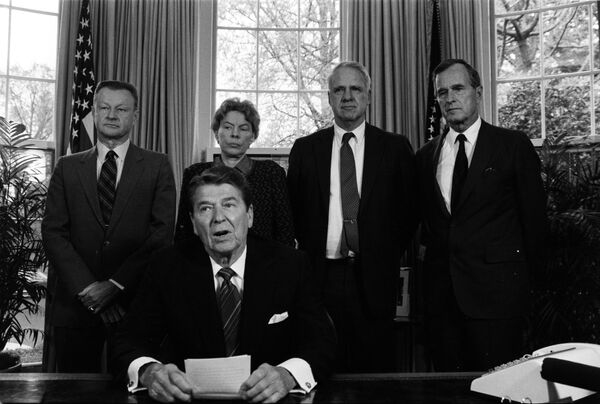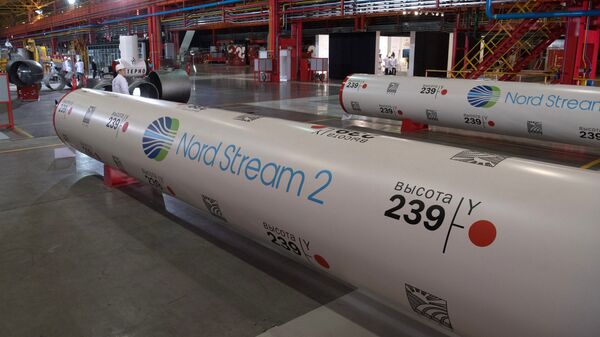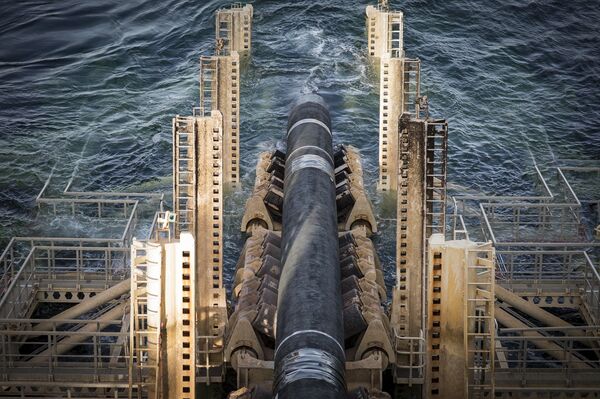US congressmen pushing ahead with sanctions against the Nord Stream 2 project are running out of time as the completion of the endeavour is nearing, with 75 percent of the overall length of the twin pipeline having been laid.
In late July, the US Senate Foreign Relations Committee approved the Protecting Europe’s Energy Security Act 2019 that would sanction vessels engaged in pipe-laying for the construction of Nord Stream 2, as well as "foreign persons" who "sold, leased, or provided those vessels". In other words, if enacted, the legislation may hit some of 1,000 companies from 25 countries working on the project.
The bill has yet to pass the House and Senate before ending up in the hands of President Donald Trump, who has repeatedly lambasted his Western European allies for relying on Russian pipeline gas.
Why Reagan Administration Failed to Force Europe to Axe Soviet Gas Pipeline
The unfolding situation evokes strong memories of the Reagan administration's failed attempts to halt the implementation of the USSR's West Siberian pipeline (“Brotherhood”) aimed at transporting Soviet natural gas to Central and Western Europe through Ukraine in the 1980s.
"[President Ronald] Reagan wanted to fix the US domestic economy, which was the job he assigned to me", recalls Dr Paul Craig Roberts, an American economist who served as the United States assistant secretary of the Treasury for Economic Policy. "Once the US economy was fixed, Reagan wanted to use America’s superior economic position to force the Soviet leaders to negotiate the end of the Cold War. Therefore, in the meantime he did not want any Soviet successes that would boost Soviet confidence and make them unwilling to negotiate".
According to Dr Roberts "Reagan believed that if things were going well for the Soviets they would have no incentive to end the Cold War".
To that end, in December 1981 the Reagan administration introduced sanctions preventing US companies from exporting oil and gas technologies to the Soviet Union, while in June 1982 these sanctions were expanded to Europe.
However, as The New York Times outlined in January 1982, West European governments were generally reluctant to follow Reagan's suit. Furthermore, West Germany, which supplied most of the steel pipelines and technology for the Soviet-led project "remain[ed] firmly in favour of the deal".
Likewise, France and Great Britain openly defied the US-backed ban on supplies for the Soviet natural gas endeavour in July and August 1982. The European Economic Community agreed that the US' "unilateral action could not be accepted", which prompted the White House to lift sanctions against European and American companies participating in the project in November 1982.

Reagan's Rationale Differed From That of US Neoconservatives
While the Reagan administration's rationale was quite clear, it prompts the question why the US is trying to throw wrench into Nord Stream 2 after the end of the Cold War.
According to Dr Roberts, the truth of the matter is that Reagan's policy, aimed at finishing the decades-long standoff, differed much from that of US neoconservatives, who have been propagating "American unilateralism" since the collapse of the USSR in 1991.
"It is important to understand that what appears to be Reagan’s hostile policy against the Soviet Union was in fact a policy designed to convince the Soviet government that it was time to end the Cold War", he argues.
In contrast, "the neoconservative [US] governments of the 21st century are determined to eliminate Russia’s independent policy, and they fear that expanding economic ties between Russia and Europe will weaken Washington’s grip on its European empire", the former Reagan official suggests.
"Russia is a check on Washington’s power like the Soviet Union was", Dr Roberts says. "Therefore, Russia is in the way of Washington’s unilateralism. This is a serious affront to the ruling neoconservatives".
According to him, Washington has weaponised various tools to maintain control over its European allies.
For instance, "Washington has extraordinary leverage over the entire world" as long as the US dollar remains the world reserve currency, the economist highlights. Apart from this, the US leadership "has blackmail material on every European political leader", he remarks in an apparent reference to ex-NSA contractor Edward Snowden’s revelations about US worldwide surveillance.
Given all of the above, "a revolution from below would be required to free Europe from Washington’s control", Dr Roberts believes.
Nord Stream 2 Project's Implementation Goes On Despite Obstacles
Meanwhile, none of the companies engaged in Nord Stream 2 have backed out of the endeavour despite US threats, according to the project’s spokesperson Jens Mueller.
While the pipeline is designed to pass through the territorial waters or exclusive economic zones of Russia, Finland, Germany, Sweden, and Denmark, the latter is the only country that hesitated to give the green light to the pipeline construction, citing environmental concerns.
However, Nord Stream 2 has found a way to overcome the obstacle: on 15 April 2019, the company filed an application for an alternative route outside Danish territorial waters and only passing via the Danish exclusive economic zone north-west of Bornholm.
"The procedure for handling the application for the route north-west of Bornholm has been completed and shown that all technical and environmental prerequisites can be fulfilled, and consent to the route as envisaged by UNCLOS1982 can be granted", the pipeline operator reported on 28 June 2019.
Russian gas giant Gazprom expects that Denmark will grant permission to the pipeline construction in October and plans to complete the project by the end of 2019.
The goal of the Nord Stream 2 project is to double the capacity of the initial Nord Stream gas pipeline running from Russia to Germany, thus increasing its overall annual capacity to 110 billion cubic metres (3.9 trillion cubic feet). Five major European energy companies – France's ENGIE, Austria's OMV, British-Dutch Royal Dutch Shell, and Germany's Uniper and Wintershall – are taking part in the project along with Gazprom.
The views and opinions expressed by the speaker and contributor do not necessarily reflect those of Sputnik.



